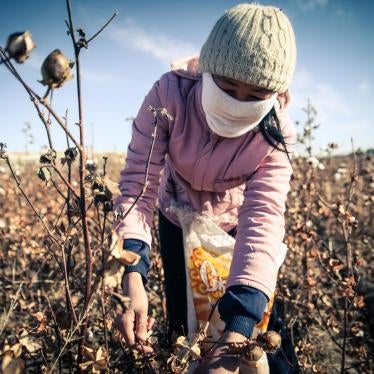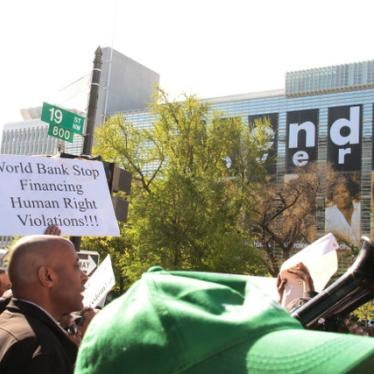The World Bank president, Jim Kim, said last year that he was going to re-orient the institution, declaring, “We have to make growth more equitable.” But the World Bank’s investments in Uzbekistan tell a different story. The Bank has loaned more than half a billion dollars to Uzbekistan’s agriculture sector in recent years, while fully aware that the cotton harvest relies on a massive government program of forced labor and that cotton profits are largely swallowed up by opaque government accounts. It is difficult to imagine how any growth stemming from the World Bank’s current agriculture investments will benefit Uzbekistan’s poor.
For several weeks in the fall of 2015, government officials forced a 47-year-old grandmother to pick cotton in an area where the World Bank is lending the Uzbek government US$260.79 million to rejuvenate the irrigation system. Cotton is grown on more than 50 percent of the arable land within this project area. The local neighborhood council threatened to withhold child welfare benefits for the woman’s grandson if she did not work in the fields. The government’s abusive practices are not confined to adults. During the 2016 harvest government officials forced children as young as 10 to work in the cotton fields.
As the fifth-largest cotton producer in the world, Uzbekistan generates an estimated $1 billion in revenue, or about a quarter of the country’s gross domestic product, from one million tons of cotton fiber annually. These funds go into an extra-budgetary account in the Ministry of Finance that is not open to public scrutiny and is controlled by high-level officials.
Our new research, along with the Uzbek-German Forum for Human Rights, shows that the Uzbek government forced enormous numbers of students, teachers, medical workers, other government employees, private-sector employees, and sometimes children to harvest cotton in 2015 and 2016, as well as to weed the fields and plant cotton in the spring of 2016. The Uzbek-German Forum estimates that the government forces more than a million people to work in the cotton fields every year. Withholding welfare benefits is just one of the penalties the Uzbek government has used for anyone who tries to avoid forced labor in the cotton fields. Through employers, tax authorities, local government officials, schools, and others, the government has threatened to fire people, close down small businesses, and expel students.
People living in poverty are particularly susceptible to forced labor, since they can’t risk losing their jobs or benefits by refusing to work and can’t afford to pay people to work in their place. At the same time, the forced labor system grossly undermines the education system, which the World Bank has also heavily invested in, with teachers forced to take time off from the classroom each year to work in the cotton fields and classes sometimes suspended for weeks. “Our students are becoming less and less educated,” one teacher told us. “The situation is the same in colleges. Students who want to continue their education must hire private tutors.”
One condition of the Bank’s irrigation project was that the government comply with laws prohibiting forced and child labor within the project area. If it did not, the Bank could suspend the loan. But the Uzbek government flouted this condition, and the World Bank continued business as usual. Instead of suspending its loan following the 2015 harvest, which was defined by forced labor and attacks on human rights defenders who tried to document these abuses, the World Bank increased its investments in Uzbekistan’s agriculture industry through its private sector lending arm, the International Finance Corporation (IFC).
In December 2015 the IFC agreed to loan Indorama Kokand Textile, a leading cotton yarn producer in Uzbekistan, $40 million to expand its textile plant. Given the scale of forced labor in Uzbekistan and its systemic nature, it is highly unlikely that a company, which uses only cotton from Uzbekistan, could find any significant quantity that has not been harvested, at least in part, by forced laborers, not to mention the significant risk that child labor is involved.
Earlier this year, Kim emphasized that the bank needs to ask itself, “What’s in the best interest of poor countries and poor people? … And do these investments align with our core values: access, inclusion, and equality?” But despite his thoughtful words, the World Bank’s investments in Uzbekistan help prop up a system that violates people’s rights — and particularly the rights of people living in poverty. The bank should immediately suspend these investments, and only resume them once the forced-labor system is dismantled.
Jessica Evans leads Human Rights Watch’s work on international financial institutions.







